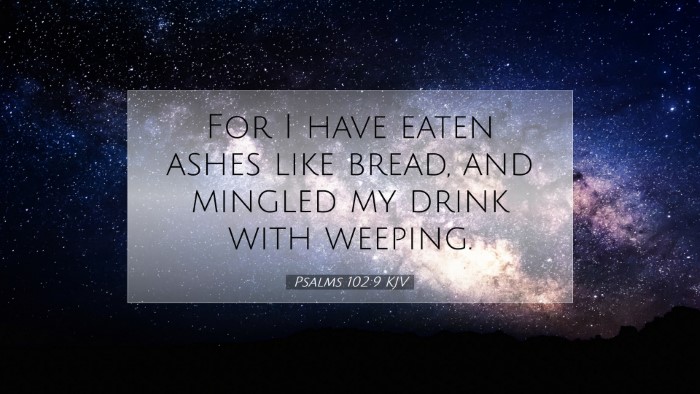Psalms 102:9 Commentary
Bible Verse: "For I have eaten ashes like bread, and mingled my drink with weeping."
Introduction
The verse from Psalms 102:9 is packed with emotional intensity and vivid imagery. In this passage, the psalmist conveys a deep sense of despair and suffering, articulating the profound sorrow that accompanies his state. The metaphors of consuming "ashes" and mixing "drink with weeping" illustrate not merely personal anguish but a wider theological reflection on human suffering and divine presence. This commentary synthesizes the insights of public domain theologians, offering reflections suitable for pastors, students, theologians, and Bible scholars.
Historical Context
The Book of Psalms serves as a compendium of Hebrew poetry, expressing a range of human emotions—from exaltation and joy to lament and despair. Psalm 102 is attributed to an anonymous author, likely amidst exile or personal tribulation. The communal and personal dimensions of suffering are vital for understanding the depth of this verse.
Analytical Insights
Verse Analysis
According to Matthew Henry, the imagery of “ashes” symbolizes desolation and mourning. In the Near Eastern context, ashes represent judgment and ruin, often associated with loss. The act of consuming ashes reflects a complete sense of hopelessness, indicating that the psalmist’s situation is so dire that sustenance is replaced by symbols of devastation.
Albert Barnes further elaborates this sentiment by emphasizing the juxtaposition between sustenance and despair. The “bread” is transformed into ashes, illustrating a shift from life's necessities to elements of affliction. This reinforces the notion that the psalmist is experiencing life in its most desolate form—there is no nourishment, and what remains is bleakness.
Literal and Figurative Interpretations
Adam Clarke offers a insightful figurative interpretation of the phrase “mingled my drink with weeping.” The act of weeping obscures the very essence of refreshment and joy that drink should represent. Here, Clarke interprets weeping as a potent theological statement: emotional pain can overshadow the most fundamental needs in life. The vivid contrast between drinking to refresh oneself and mixing that drink with tears speaks volumes about the nature of sorrow that the psalmist endures.
Theological Reflections
This passage invites reflection on the nature of human suffering. By expressing such emotional depth, the psalmist acknowledges the reality of grief and pain in the faith journey. It reveals a God who can handle our raw feelings—sorrow, mourning, and cries—instead of merely seeking superficial expressions of joy.
The Presence of God
Despite his lamentations, the psalmist's cry is still directed toward God, suggesting the possibility of hope even amid despair. According to Matthew Henry, one of the most profound implications of this verse is that mourning should lead us to God, where comfort can be found. This relationship is pivotal; God’s attentive ear hears our sorrows and understands our deepest needs.
The Journey from Despair to Hope
Throughout the psalm, there is an undercurrent of a journey from despair to hope. The sorrows articulated in verses like 102:9 are foundational to understanding redemptive theology. Albert Barnes notes that the acknowledgment of sorrow is the first step toward restoration. The acceptance of pain is crucial for the psalmist as it leads him toward God’s healing power.
Practical Applications
- For Pastors: This verse serves as a reminder to validate the spiritual journeys of individuals who experience deep sorrow. Emphasizing God’s understanding of human pain can foster pastoral care that is compassionate and sensitive.
- For Students: Engaging with the language and imagery in Psalms encourages deeper literary and theological exploration. It can serve as a basis for studies about the human emotional experience in relation to faith.
- For Theologians: The interplay between lament and hope in Psalms 102:9 invites scholarly inquiry into the theology of suffering. Exploring the historical context can yield insights regarding ancient perspectives on mourning and God's response.
- For Bible Scholars: Analyzing the literary structure and poetic devices within Psalms enhances understanding of the text. This analysis contributes to debates surrounding Hebrew poetry and its reflection of communal and individual lamentation experiences.
Conclusion
Psalms 102:9 encapsulates the anguish of the human condition while simultaneously offering a glimpse of hope through divine engagement. Through the combined reflections of historical theologians, we are reminded that our suffering is heard, validated, and ultimately directed toward restoration through a loving and understanding God. In both personal and communal contexts, this passage calls us into deeper faith and highlights the transformative power of vulnerability before God.


